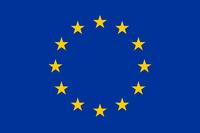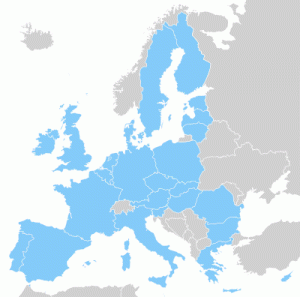EU发表评论(0)编辑词条
The European Union (EU) is an economic and political union of 27 member
states, located primarily in Europe. It was established by the Treaty of Maastricht on 1 November 1993, upon the foundations of the pre-existing European Economic Community. With a population of almost 500 million, the EU generates an estimated 30% share (US$18.4 trillion in 2008) of the nominal gross world product.
The EU has developed a single market through a standardised system of laws which apply in all member states, ensuring the freedom of movement of people, goods, services and capital. It maintains common policies on trade, agriculture, fisheries, and regional development. A common currency, the euro, has been adopted by sixteen member states constituting the Eurozone. The EU has developed a limited role in foreign policy, having representation at the WTO, G8 summits, and at the UN. It enacts legislation in justice and home affairs, including the abolition of passport controls between many member states which form part of the Schengen Area. Twenty-one EU countries are members of NATO.
The EU operates through a hybrid system of intergovernmentalism and supranationalism. In certain areas it depends upon agreement between the member states, in others, supranational bodies are able to make decisions without unanimity. Important institutions and bodies of the EU include the European Commission, the Council of the European Union, the European Council, the European Court of Justice and the European Central Bank. The European Parliament is elected every five years by member states' citizens, to whom the citizenship of the European Union is guaranteed.
The EU traces its origins to the European Coal and Steel Community formed among six countries in 1951 and the Treaty of Rome in 1957. Since then the union has grown in size through the accession of new countries, and new policy areas have been added to the remit of the EU's institutions.
Member states
The European Union is composed of 27 independent sovereign states
which are known as member states: Austria, Belgium, Bulgaria, Cyprus, the Czech Republic, Denmark, Estonia, Finland, France, Germany, Greece, Hungary, Ireland, Italy, Latvia, Lithuania, Luxembourg, Malta, the Netherlands, Poland, Portugal, Romania, Slovakia, Slovenia, Spain, Sweden, and the United Kingdom.
There are three official candidate countries, Croatia, Macedonia, and Turkey. The western Balkan countries of Albania, Bosnia and Herzegovina, Montenegro, and Serbia are officially recognised as potential candidates Kosovo is also listed by the European Commission as a potential candidate but the Commission does not list it as an independent country because not all member states recognise it as an independent country, separate from Serbia.
To join the EU, a country must meet the Copenhagen criteria, defined at the 1993 Copenhagen European Council. These require a stable democracy which respects human rights and the rule of law; a functioning market economy capable of competition within the EU; and the acceptance of the obligations of membership, including EU law. Evaluation of a country's fulfilment of the criteria is the responsibility of the European Council. The current framework does not specify how a country could exit the Union (although Greenland, and Faroe Islands (the latter being a part of the European continent) two territories of Denmark, withdrew in 1985), but the proposed Treaty of Lisbon contains a formal procedure for withdrawing.
Four Western European countries that have chosen not to join the EU have partly committed to the EU's economy and regulations: Iceland, Liechtenstein, and Norway are a part of the single market through the European Economic Area, and Switzerland has similar ties through bilateral treaties. The relationships of the European microstates: Andorra, Monaco, San Marino, and the Vatican include the use of the euro and other areas of co-operation.
欧盟简介
欧洲联盟(European Union),简称欧盟(EU),是由欧洲共同体 (European Communities,又称欧洲共同市场) 发展而来的,主要经历了三个阶段:荷卢比三国经济联盟、欧洲共同体、欧盟。其是一个集政治实体和经济实体于一身、在世界上具有重要影响的区域一体化组织。1991年12月,欧洲共同体马斯特里赫特首脑会议通过《欧洲联盟条约》 ,通称《马斯特里赫特条约》(简称《马约》)。1993年11月1日,《马约》正式生效,欧盟正式诞生。
欧盟现有27个成员国和近5亿人口(2007年1月),欧盟的宗旨是“通过建立无内部边界的空间,加强经济、社会的协调发展和建立最终实行统一货币的经济货币联盟,促进成员国经济和社会的均衡发展”,“通过实行共同外交和安全政策,在国际舞台上弘扬联盟的个性”。欧盟27国总面积432.2万平方公里。
欧盟成员
欧共体创始国为法国、联邦德国、意大利、荷兰、比利时和卢森堡六国。
至2009年1月止共有27个成员国,他们是:
法国、德国、意大利、荷兰、比利时、卢森堡、英国、丹麦、爱尔兰、希腊、葡萄牙、西班牙、奥地利、瑞典、芬兰、马耳他、塞浦路斯、波兰、匈牙利、捷克、斯洛伐克、斯洛文尼亚、爱沙尼亚、拉脱维亚、立陶宛、罗马尼亚、保加利亚。
成立过程
欧洲统一思潮存在已久,在第二次世界大战后进入高潮。1946年9月,英国首相丘吉尔曾提议建立 “欧洲合众国”。1950年5月9日,法国外长罗伯特•舒曼提出欧洲煤钢共同体计划(即舒曼计划),旨在约束德国。1951年4月18日,法、意、联邦德国、荷、比、卢六国签订了为期50年的《关于建立欧洲煤钢共同体的条约》。1955年6月1日,参加欧洲煤钢共同体的六国外长在意大利墨西拿举行会议,建议将煤钢共同体的原则推广到其他经济领域,并建立共同市场。1957年3月25日,6国外长在罗马签订了建立欧洲经济共同体与欧洲原子能共同体的两个条约,即《罗马条约》,于1958年1月1日生效。1965年4月8日,6国签订了《布鲁塞尔条约》,决定将欧洲煤钢共同体、欧洲原子能共同体和欧洲经济共同体统一起来,统称欧洲共同体。条约于1967年7月1日生效 。欧共体总部设在比利时布鲁塞尔。1991年12月11日,欧共体马斯特里赫特首脑会议通过了建立“欧洲经济货币联盟”和“欧洲政治联盟”的《欧洲联盟条约》(通称马斯特里赫特条约,简称“马约”)。1992年2月1日,各国外长正式签署马约。经欧共体各成员国批准,马约于1993 年11月1日正式生效,欧共体开始向欧洲联盟过渡。1993年11月1日“马约”正式生效,欧共体更名为欧盟。这标志着欧共体从经济实体向经济政治实体过渡。1995年,奥地利、瑞典和芬兰加入,使欧盟成员国扩大到15个。欧盟成立后,经济快速发展,1995年至2000年间经济增速达3%,人均国内生产总值由1997年的1.9万美元上升到1999年的2.06万美元。欧盟的经济总量从1993年的约6.7万亿美元增长到2002年的近10万亿美元。
2002年 11月18日,欧盟15国外长会议决定邀请塞浦路斯、匈牙利、捷克、爱沙尼亚、拉脱维亚、立陶宛、马耳他、波兰、斯洛伐克和斯洛文尼亚10个中东欧国家入盟。2003年4月16日,在希腊首都雅典举行的欧盟首脑会议上,上述10国正式签署入盟协议。2004年5月1日,这10个国家正式成为欧盟的成员国。这是欧盟历史上的第五次扩大,也是规模最大的一次扩大。2007年1月,罗马尼亚和保加利亚两国加入欧盟,欧盟经历了6次扩大,成为一个涵盖27个国家总人口超过4.8亿的当今世界上经济实力最强、一体化程度最高的国家联合体。>>
2003年7月,欧盟制宪筹备委员会全体会议就欧盟的盟旗、盟歌、铭言与庆典日等问题达成了一致。根据宪法草案:欧盟的盟旗仍为现行的蓝底和12颗黄星图案,盟歌为贝多芬第九交响曲中的《欢乐颂》,铭言为“多元一体”,5月9日为“欧洲日 ”。
与“EU,欧盟”相关的词条
→如果您认为本词条还有待完善,请 编辑词条
词条内容仅供参考,如果您需要解决具体问题
(尤其在法律、医学等领域),建议您咨询相关领域专业人士。
0

同义词: 欧盟
关于本词条的评论 (共0条)发表评论>>









